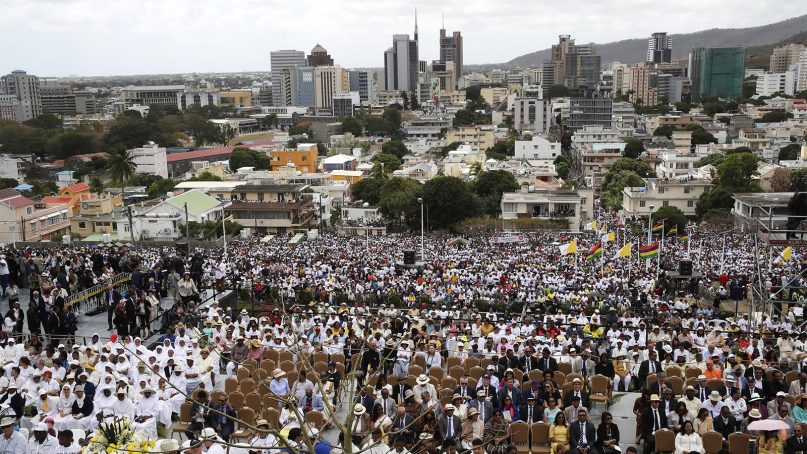VATICAN CITY (RNS) — Known as a beach bum’s paradise and a millionaire’s tax haven, the island nation of Mauritius welcomed Pope Francis, who encouraged its people to embrace their rich diversity as the country struggles with past and recent forms of colonization.
“You possess an authoritative voice, one that has taken on life,” Francis said while meeting the country’s civil and diplomatic authorities on Monday (Sept. 9).
“A voice that can remind us that it is possible to achieve lasting peace when we start with the conviction that diversity is a beautiful thing,” the pope said, urging the Mauritians to pursue a cross-cultural harmony that he called “reconciled diversity.”
Located 1,200 miles from the east coast of Africa in the Indian Ocean, Mauritius is the last stop of the pope’s three-country visit to Africa that also included Mozambique and Madagascar. It is the only Hindu majority country in Africa but is home to several other religions and cultures, largely due to the British Empire’s importation of cheap labor from nearby countries.
In light of the varied cultural makeup in the country, the pope called its leaders “to take up the challenge of welcoming and protecting those migrants who today come looking for work and, for many of them, better conditions of life for their families.”
The country has witnessed tremendous economic growth in the past decade, thanks to savvy financial policies that promoted tourism and substantial foreign investments. While today Mauritius can be described as “an oasis of peace,” Francis said at the Rèduit Presidential Palace that it must still “remain vigilant.”
The pope warned against an “idolatrous economic model that feels the need to sacrifice human lives on the altar of speculation and profit alone, considering only immediate advantage to the detriment of protecting the poor, the environment and its resources.”
Those who suffer the most in this global profit-based environment, Francis said, are young people, who are often unemployed and unsure of the future.
At the Monument to Mary, Queen of Peace, the same spot where St. John Paul II celebrated Mass when he visited the country more than 30 years ago, Francis said that young people are forced to live on the margins and are vulnerable to the new forms of slavery such as human trafficking.
“Our young people are our primary mission,” he told the thousands attending his morning Mass. “We won’t let the young face of the church and society be stolen from us! We won’t let the fruits of this land be stolen by the merchants of death!”
Attending the Mass were delegations from the Chagos Islands who came to advocate for their homeland. The British detached the archipelago from Mauritius before it achieved its independence in 1968.
Between 1968 and 1973, the United Kingdom extradited almost 2,000 people from the Chagos Islands and rented one of its atolls until 2036 to the United States in order to build the Diego Garcia military air base.
“I assure you of my prayers and closeness. May the Lord continue to give all the wisdom and strength necessary to realize the legitimate aspirations,” the pope said, mentioning the Chagos Islands directly at the end of the service.
While Francis made no mention of the specific circumstances concerning the Chagos Islands, local observers saw his statement as a sign that the pope is on their side. In the past, Francis has used strong words to condemn the similar case of the Falkland Islands, currently under British domain but claimed by his native country, Argentina.
The International Court of Justice ordered Britain to return the Chagos Islands to Mauritius in February and deemed the eviction of its people to have been unlawful. Two months later the United Nations General Assembly echoed the decision, which would make Pope Francis the third soft power to advocate for the disputed islands.





